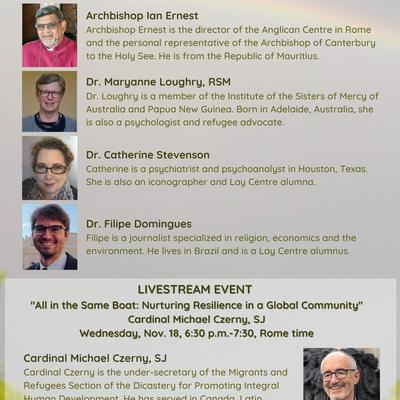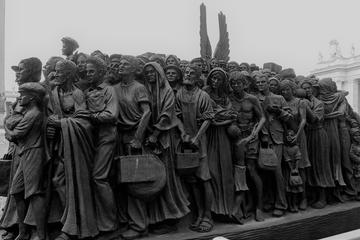
By Donna Orsuto
The COVID-19 pandemic has upturned our daily lives: women and men from every continent have had to cope with unforeseen and unprecedented challenges and loss. Every day we read the sobering and sad statistics, knowing that behind each number are the stories of real people as they try their best to return to normal. We would be naive to think that the crisis is over or that life will eventually go back to “normal.”
Following Pope Francis’ lead, we need to ask the questions: How are we to prepare for the future? How are we to get ready for the post-COVID world?
As Pope Francis said in the early days of the pandemic, “The storm has exposed our vulnerability and uncovered those false and superfluous certainties around which we constructed our daily schedules, our projects, our habits and priorities… Amid this storm, the façade of those stereotypes with which we camouflaged our egos, always worrying about appearances, has fallen away, revealing once more the ineluctable and blessed awareness that we are part of one another, that we are brothers and sisters of one another” ("Extraordinary Moment of Prayer Presided over by Pope Francis," March 27, 2020).
One response to this crisis is to be pro-active and to nurture resilience personally, in our families and communities, in the Church, and in the worldwide community.
Resilience is a psychological term, that is, the capacity to recover after a crisis or trauma. From a Christian perspective, it is not merely a personal effort to “bounce back” after a tragic situation. Resilience is best understood in the context of the virtue of fortitude, a gift from God that gives us courage and strength and enables us to overcome fear. We do not want merely to survive this crisis or any future one that comes our way, but we hope, with God’s help, to thrive and to be transformed by it into women and men who are capable of making a difference for others through a life poured out in service.
I would like to suggest that we embrace three attitudes that will help to nurture resilience.
First, focus on the essentials. Who is really important in your life? What gives meaning to your life? Viktor Frankl’s classic book, “Man’s Search for Meaning,” based on his experience in a concentration camp, demonstrates how clinging to what brings meaning to your life can contribute to surviving the most horrific suffering.
Second, be pro-active and prepare for difficult times. I remember once complaining to someone about a stressful situation. His response has remained with me: “The only time you won’t have stress is when you are dead!” Stress is normal. The difficulties and tragedies of life will touch us all at one point or another. The important thing is to prepare for them by putting into place good practices or structures that will carry us through tough times. I once read that some of the skyscrapers in San Francisco are built on roller skates: these are structures that promote change and not inertia. Michael Casey reminds us that strong, rigid buildings are the first to fall in an earthquake, but buildings that can sway manage to flow back into position undamaged (See “A Guide to Living the Truth,” p. 53).
Finally, and most importantly, a key to resilience is recognizing that we are all interconnected. We are all sisters and brothers. As Pope Francis says in “Fratelli Tutti:” “To care for the world in which we live means to care for ourselves. Yet we need to think of ourselves more and more as a family dwelling in our common home” (no.17).
The vulnerability of my brothers and sisters, both locally and globally, is also my vulnerability. I am called to do my part in creating a more resilient world for them and for me. The postscript of Dorothy Day’s “The Long Loneliness,” of which I quote only a small part, is worth re-reading in this context: “We cannot love God unless we love each other, and to love we must know each other…. We have all known the long loneliness and we have learned that the only solution is love and that love comes with community” (p. 284-285).
“Nurturing Resilience” is also the theme of our new series which starts next week, Oct. 23. We hope you will register to receive four short reflections, one per week, by email which will look at the theme from different perspectives. The first, from the director of the Anglican Centre in Rome, Archbishop Ian Ernest, develops the idea that the key to resilience is to focus on what is essential. The second, Dr. Maryanne Loughry, RSM, invites us to consider what it means to cultivate resilience in our communities and in the Church that will lead us to embrace global solidarity. The third, penned by psychiatrist Catherine Stevenson, M.D., reflects on simple and practical habits that one can cultivate daily that contribute to a more resilient way of life in moments of crisis. Finally, Dr. Filipe Domingues explores how resilience emerges in family relations in times of crisis.
The series will close with a livestream event with Cardinal Michael Czerny, SJ, in dialogue with The Lay Centre community entitled, "All in the Same Boat: Nurturing Resilience in a Global Community." Using "Fratelli Tutti" as a point of departure, Cardinal Czerny will show how, in the context of the relationship between memory, forgiveness, reconciliation, and peace, resilience is necessary to "overcome our divisions without losing our identity."
To register for our upcoming series, Nurturing Resilience: CLICK HERE
Suggestion for a musical reflection: “Gabriel’s Oboe,” by Ennio Morricone (1928-2020). Morricone was an Italian composer, orchestrator, conductor, and trumpet player who wrote music in a wide range of styles. You may like to listen to to "Gabriel's Oboe" while contemplating the beautiful image.
Image: Michelangelo Buonaroti’s "Pietà" – Commons Wikimedia
Dr. Donna Orsuto is the co-founder of The Lay Centre and a professor of spirituality at the Pontifical Gregorian University in Rome. She gives lectures and retreats worldwide and has authored two books and numerous journal articles.




